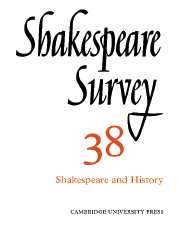Book contents
- Frontmatter
- Shakespeare’s History Plays: 1952–1983
- Shakespeare and History: Divergencies and Agreements
- Shakespeare’s Georgic Histories
- The Nature of Topicality in Love’s Labour’s Lost
- The Tragic Substructure of the Henry IV Plays
- Hal and the Regent
- The Rite of Violence in I Henry IV
- The Fortunes of Oldcastle
- Hand D in Sir Thomas More: An Essay in Misinterpretation
- Livy, Machiavelli, and Shakespeare’s Coriolanus
- Henry VIII and the Ideal England
- The Strangeness of a Dramatic Style: Rumour in Henry VIII
- ‘Edgar I Nothing Am’: Figurenposition in King Lear
- ‘Very like a whale’: Scepticism and Seeing in The Tempest
- Shakespeare’s Medical Imagination
- Shakespeare in the Theatrical Criticism of Henry Morley
- Shakespeare Performances in Stratford-upon-Avon and London 1983–4
- The Year's Contributions to Shakespearian Study 1 Critical Studies
- 2 Shakespeare’s Life, Times and Stage
- 3 Editions and Textual Studies
- Index
Shakespeare and History: Divergencies and Agreements
Published online by Cambridge University Press: 28 March 2007
- Frontmatter
- Shakespeare’s History Plays: 1952–1983
- Shakespeare and History: Divergencies and Agreements
- Shakespeare’s Georgic Histories
- The Nature of Topicality in Love’s Labour’s Lost
- The Tragic Substructure of the Henry IV Plays
- Hal and the Regent
- The Rite of Violence in I Henry IV
- The Fortunes of Oldcastle
- Hand D in Sir Thomas More: An Essay in Misinterpretation
- Livy, Machiavelli, and Shakespeare’s Coriolanus
- Henry VIII and the Ideal England
- The Strangeness of a Dramatic Style: Rumour in Henry VIII
- ‘Edgar I Nothing Am’: Figurenposition in King Lear
- ‘Very like a whale’: Scepticism and Seeing in The Tempest
- Shakespeare’s Medical Imagination
- Shakespeare in the Theatrical Criticism of Henry Morley
- Shakespeare Performances in Stratford-upon-Avon and London 1983–4
- The Year's Contributions to Shakespearian Study 1 Critical Studies
- 2 Shakespeare’s Life, Times and Stage
- 3 Editions and Textual Studies
- Index
Summary
In the autumn of 1601, in the miserable atmosphere which followed the rebellion and execution of the Earl of Essex, the antiquary William Lambarde came to Greenwich to present to Elizabeth I the fruits of his long years of research in the royal archives. Turning the pages of his book, the Queen reached the reign of Richard II and said, 'I am Richard II, know ye not that?' Lambarde took her meaning at once, for earlier in the year the identification had been so commonly made by the Essex faction that the Earl's supporters had commissioned a special performance by the Lord Chamberlain's Men of Shakespeare's Richard II, despite the fact that it had been long out of the repertory and that the actors prophesied a poor audience.
This is a well-known episode, but it does have something to say about the problems of relating the plays of William Shakespeare to the world he lived in - indeed, about the whole vexed relationship between literature and history. Insisting on the historical dimension in a book or a play is not universally welcomed by students of literature, and literature and literary evidence is certainly out of fashion among historians. They have lost the old confidence that if we want to see an Elizabethan pedlar we have only to look at Autolycus, and that we can learn everything about the Elizabethan military machine by watching Falstaff press men for Henry IV's army and march off with the diseased and feeble, and £3 in Bardolph's pocket for freeing the able-bodied. As for artistic imagination, this is feared as a distortion, not welcomed as an illumination.
- Type
- Chapter
- Information
- Shakespeare Survey , pp. 19 - 36Publisher: Cambridge University PressPrint publication year: 1986
- 1
- Cited by



